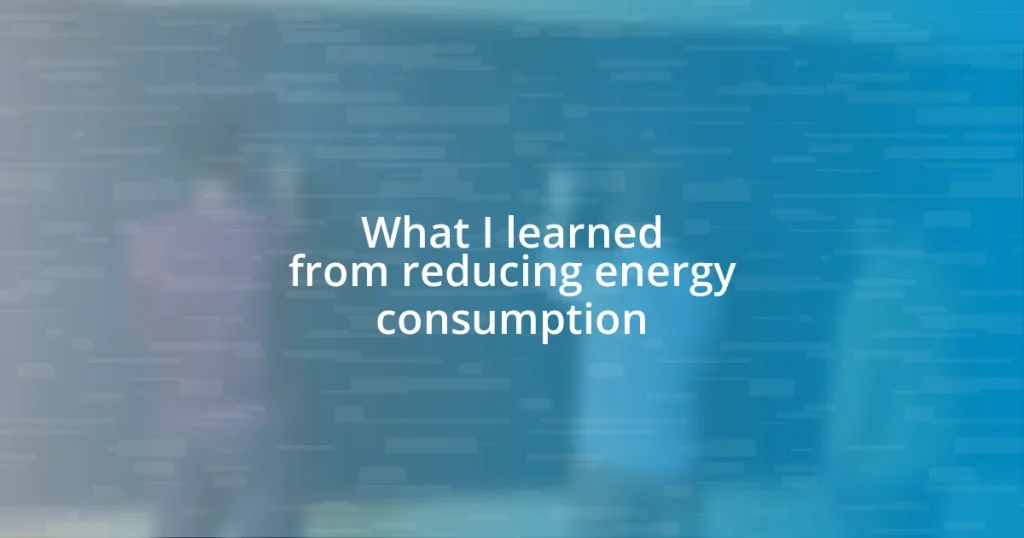Key takeaways:
- Many household devices, like refrigerators, can significantly increase energy consumption, highlighting the need for mindful usage and appliance awareness.
- Implementing practical strategies, such as using smart power strips and switching to LED bulbs, leads to cost savings and a reduced carbon footprint.
- Monitoring energy consumption reveals patterns that help optimize usage, ultimately allowing for long-term savings and fostering a sustainable mindset.
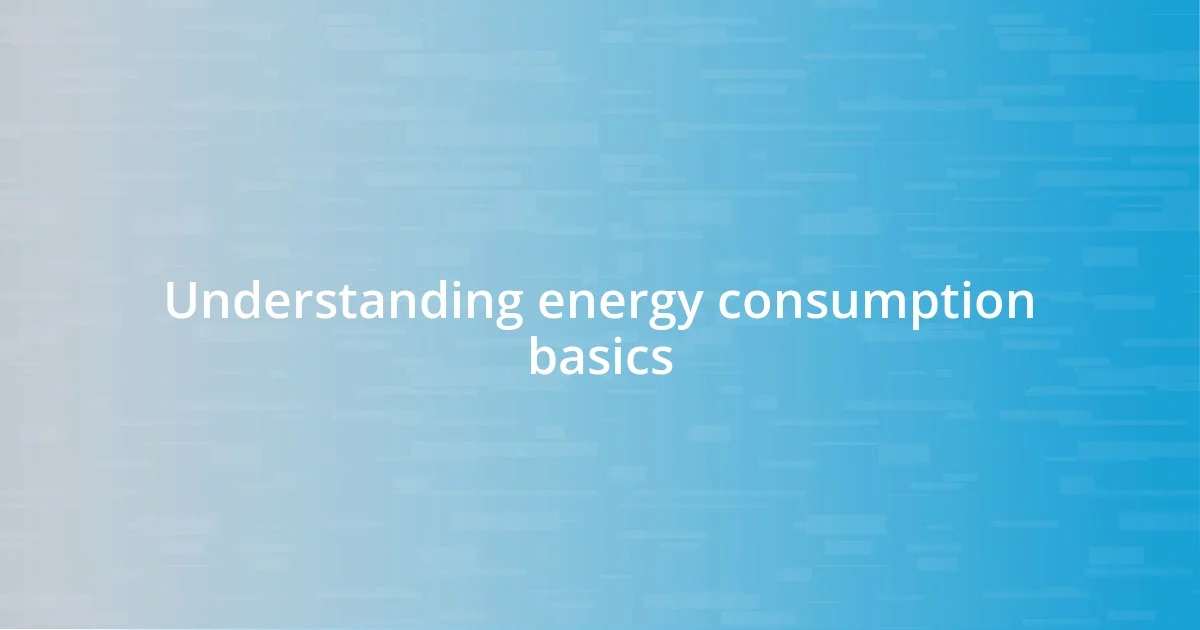
Understanding energy consumption basics
Understanding how energy consumption works is fundamental for anyone aiming to make a positive impact on their electric bill and the environment. For instance, I remember the first time I looked at my energy bill with a critical eye. It dawned on me—how many devices were drawing power, even when I thought they weren’t in use? This realization sparked a deeper investigation into energy-hungry appliances in my life.
Many people might not realize that the largest energy consumers in our homes are often the ones we overlook. Have you ever thought about how much energy a refrigerator uses over its lifespan? I was genuinely surprised to learn that it can consume up to 50% of a household’s electrical usage! This statistic hit home for me, making me rethink the age-old practice of keeping my fridge overflowing.
It’s also crucial to understand the difference between renewable and non-renewable energy sources. I once felt conflicted about my energy choices until I learned that using renewable sources not only helps reduce greenhouse gas emissions but can also lead to significant long-term savings. Can you imagine the feeling of powering your home with sunshine or wind? It inspired me to explore solar options that can benefit both my wallet and the planet.
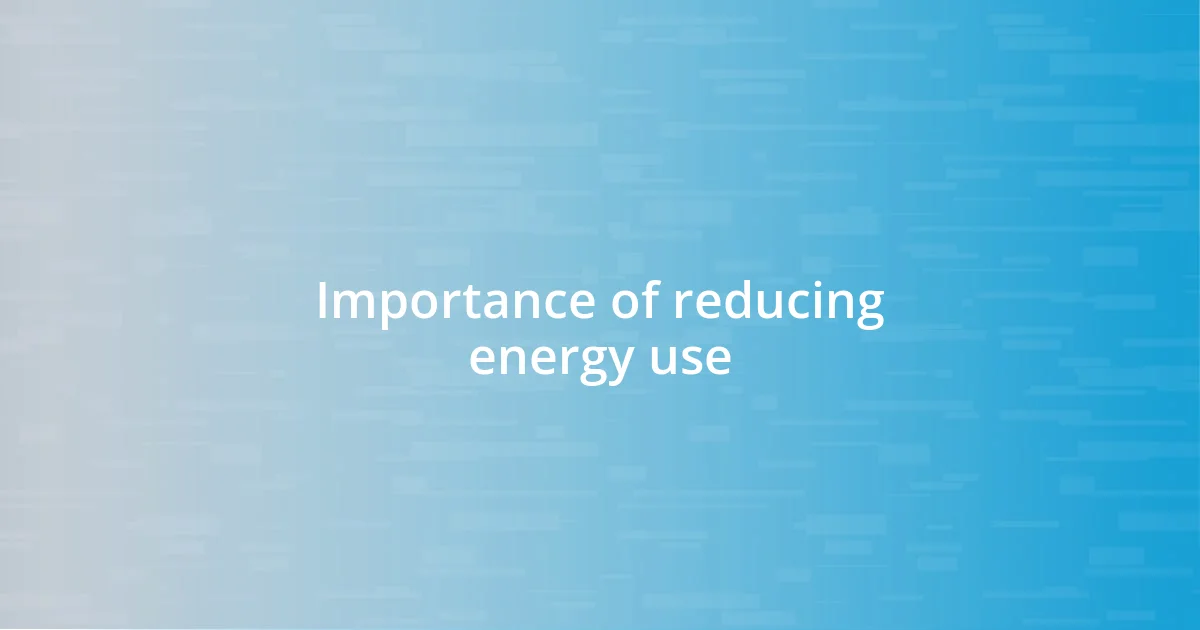
Importance of reducing energy use
Reducing energy use is not just about saving money; it also plays a crucial role in conserving our planet’s resources. I remember when I switched to LED bulbs, feeling a sense of accomplishment as I saw the difference in my electricity bill. It wasn’t just a few dollars—it added up to a substantial amount over time, and knowing that I was contributing to a larger cause was incredibly rewarding.
Another significant aspect is how our behavior impacts energy demand. For instance, I started unplugging chargers and electronics when they weren’t in use, and it felt empowering to take control of my energy consumption. It’s fascinating to see how small changes can lead to greater awareness and encourage others to follow suit. Have you considered how your daily habits contribute to energy waste? I found that simply being mindful helped shift my perspective on energy use.
Lastly, the environmental implications of reducing energy consumption can’t be overlooked. Every time I turn off an unnecessary light or choose to walk instead of driving, I feel a connection to something larger than myself. This sense of responsibility enhances my appreciation for nature and reinforces my commitment to leaving a healthier planet for future generations.
| Benefit | Details |
|---|---|
| Cost Savings | Lower energy bills due to reduced consumption |
| Environmental Impact | Decreased carbon footprint through reduced energy use |
| Awareness and Responsibility | Encourages mindful behavior and sustainable practices |
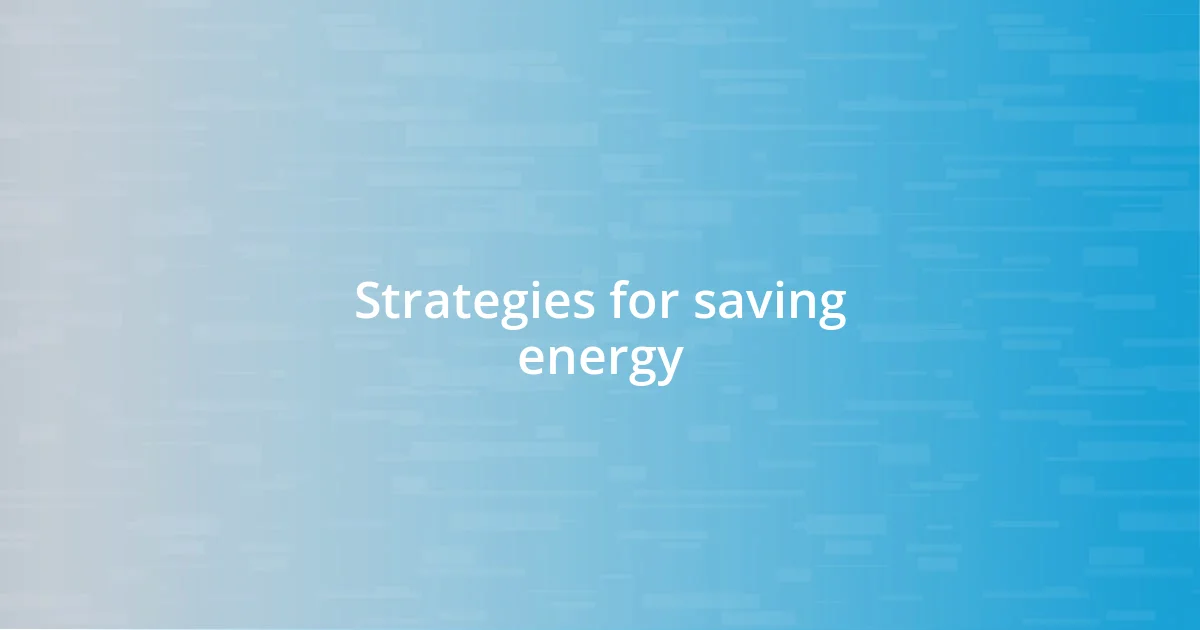
Strategies for saving energy
One of the most effective strategies I adopted was establishing a routine for energy usage throughout the day. I remember feeling quite liberated when I started implementing a “lights out” policy after sunset, which not only brightened my mood but also lowered my evening energy consumption. The simple act of dimming lights or relying on natural daylight during the day reminded me of how possible it is to live comfortably with less.
Here are some practical strategies to consider:
- Use Smart Power Strips: These cut off power to devices when they’re not in use, saving you from phantom energy drains.
- Set Thermostat Wisely: I learned to adjust my thermostat by just a few degrees. It significantly impacted my heating and cooling costs.
- Embrace Air Drying: Instead of using the dryer, I started air-drying clothes. It felt refreshing to have fresh air soften my laundry and it was a great way to enjoy the outdoors more.
- Optimize Appliance Use: Scheduling dishwashing and laundry during off-peak hours not only saves energy but has also taught me about the intricacies of utility pricing.
- Invest in Energy-efficient Appliances: I decided to replace my old appliances gradually. The feeling of knowing I’m using devices that consume less energy was a satisfying reward in itself.
Implementing these changes was more than just about saving dollars; it felt like taking meaningful steps toward a positive lifestyle change. The emotional satisfaction I gained from witnessing the immediate results on my next bill was exhilarating.
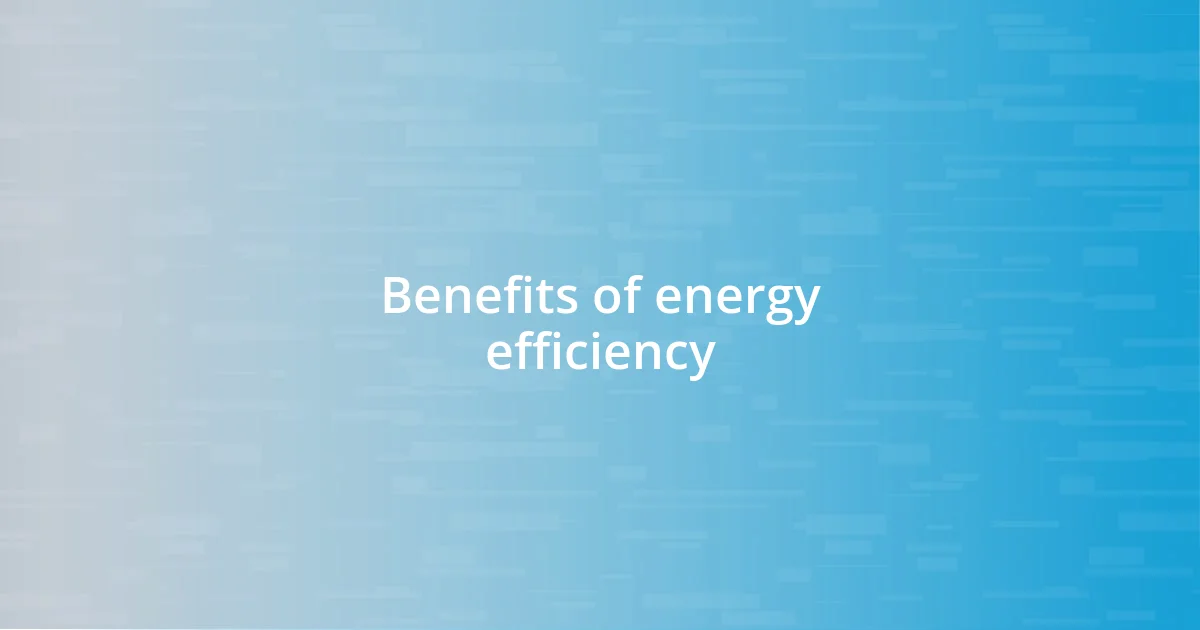
Benefits of energy efficiency
Energy efficiency brings a wealth of benefits that reverberate beyond just monetary savings. When I first realized how much less I was spending each month on utilities, it was like a weight lifted off my shoulders. Who doesn’t enjoy the thrill of checking the bill and knowing they’ve contributed to a greener planet?
Moreover, embracing energy-efficient practices fosters a deeper connection to our environment. Each time I walk past my thermostat and see the dial set just right, I can’t help but feel a sense of pride. The thought of reducing my carbon footprint empowers me. It’s exhilarating to know that our small choices can collectively impact global climate change.
Perhaps the greatest benefit lies in the awareness we develop as we strive for energy efficiency. I remember the first time I switched off appliances at the socket instead of leaving them on standby. It seemed like a minor action, but I quickly discovered that it encouraged me to adopt a more sustainable mindset in other areas of my life. Have you ever experienced that shift in perspective from mindful energy usage? I found it invigorating—like opening a door to new habits that honor both my wallet and our world.
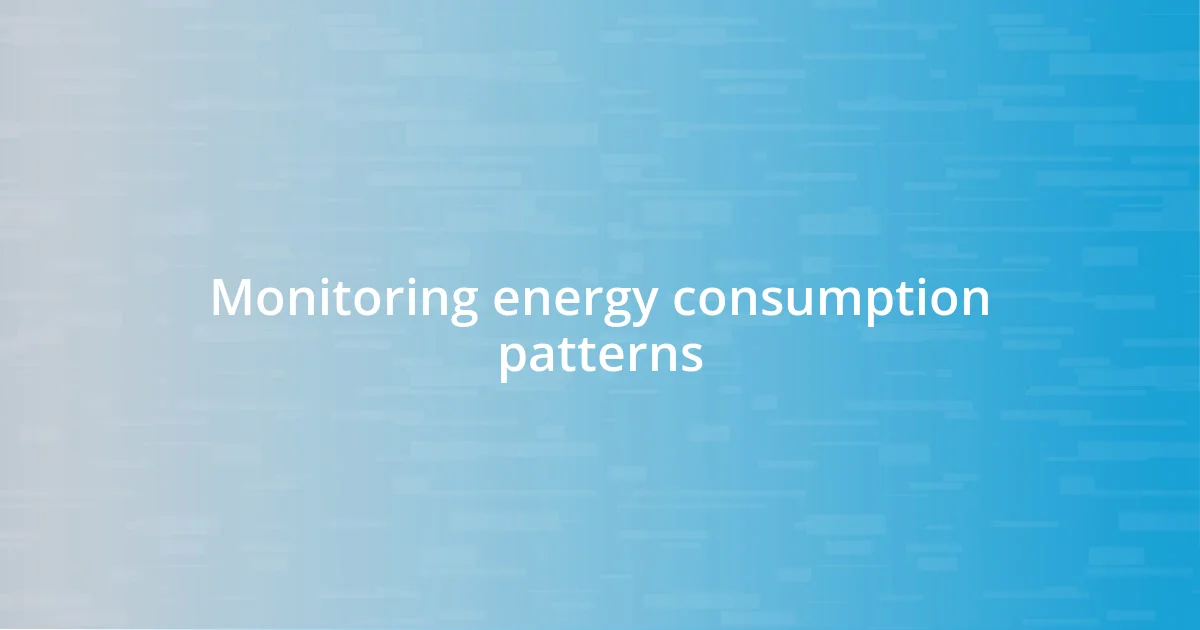
Monitoring energy consumption patterns
Monitoring energy consumption patterns has been a game changer for me. I vividly recall my surprise when I first installed an energy monitoring tool. It transformed data into visual insights, showing me when and where I consumed the most energy. Watching those spikes on my chart prompted me to reconsider my habits, revealing that my late-night TV binge-watching was draining more energy than my morning routine.
As I began to track my consumption weekly, I uncovered some fascinating trends. I found that peak usage often aligned with my cooking habits, specifically during weekends when I indulged in lengthy meal prep sessions. Adjusting my schedule, I realized I could cook in bulk and use my oven during off-peak hours. This decision not only optimized my energy use but also filled my fridge with healthy meals, reducing food waste at the same time.
I also learned to appreciate the subtle aspects of my energy consumption. For instance, when I started to compare different devices’ usage statistics, I was astonished to find that my older refrigerator consumed significantly more than the newer model I’d been considering. It struck me—sometimes the devices we trust can be the biggest culprits in our energy bills. This newfound awareness didn’t just save me money; it shifted my mindset about every electrical device I owned and opened my eyes to the long-term benefits of energy efficiency. Do you think our everyday choices influence our larger life goals? I certainly believe they do.
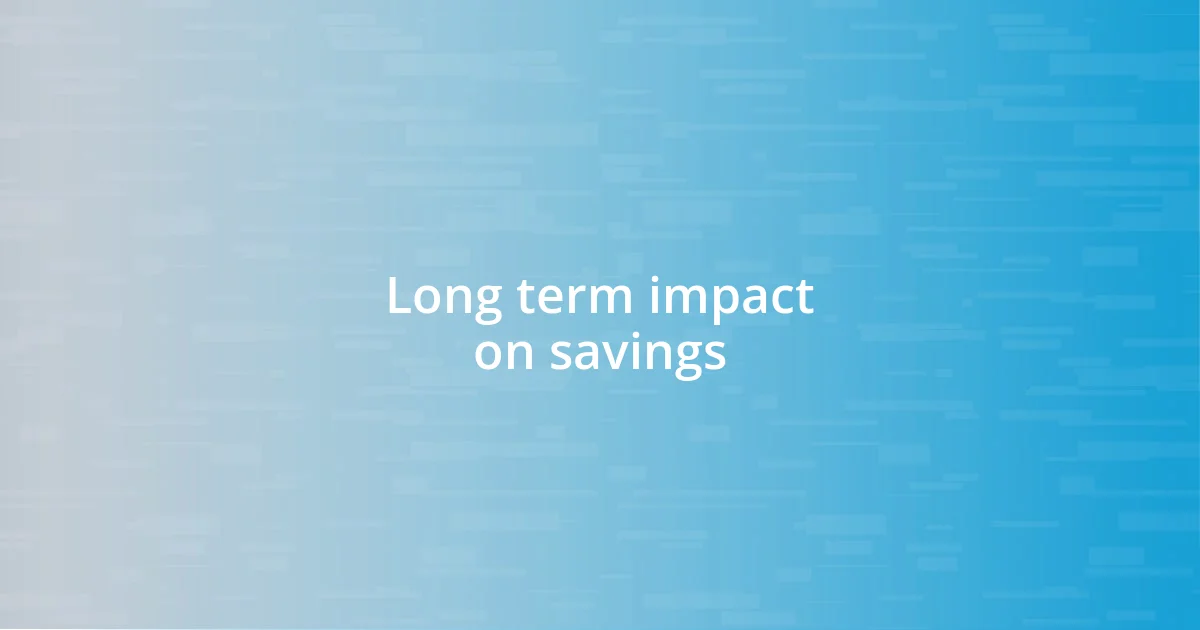
Long term impact on savings
Over time, I’ve noticed that my efforts to reduce energy consumption have led to significant savings on my utility bills. It’s amazing how small measures, such as using energy-efficient bulbs or unplugging devices when not in use, add up over the months. I remember the thrill of finally comparing my yearly bills—seeing a noticeable dip made all those little changes feel worth it.
As I continued this journey, I realized that these savings opened up opportunities for me to invest in other areas of my life. Rather than feeling like my income was being swallowed by energy costs, I found myself with extra funds to spend on activities that truly matter—like family outings or personal hobbies. Isn’t it exciting to think about how being mindful of energy use could allow us to fund dreams or experiences we previously thought were out of reach?
Reflecting on my long-term savings, I can’t help but feel a sense of empowerment. I’ve not only reduced expenses but also created a habit of mindfulness that extends into other financial decisions. By shifting my focus to energy usage, I’ve unwittingly learned to evaluate my spending as a whole. This mindset change has allowed me to appreciate the compounded benefits of thoughtful choices—saving money while nurturing a lifestyle that values sustainability. How often do we get the chance to transform our small actions into long-term wins? For me, it’s been a journey of growth and optimism.











